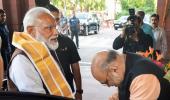Vijay Rupani may have been a soft-spoken chief minister, but political observers feel that it may have also contributed to his image of being a 'weak' CM, who allowed bureaucrats to overrule the political leadership in taking key decisions.

Some observers also point to the way he handled the second wave of COVID-19 pandemic and economic and social distress that followed it, even suggesting that it may have contributed to his downfall.
During his second stint as the CM, Rupani, 65 , who resigned from the post on Saturday over a year before the next assembly polls are due, was instrumental in passing tough anti-conversion law against interfaith marriages, and another one against those involved in cow slaughter.
Though Prime Minister Narendra Modi was the Bharatiya Janata Party's face in the high-octane 2019 Lok Sabha election campaign in his home state, it was Rupani, belonging to the relatively small Jain community, who as CM steered the party machinery in Gujarat.
Born in Rangoon (now Yangon, Myanmar) Rupani joined an Rashtriya Swayamsevak Sangh shakha as a schoolboy, before graduating to the BJP via the Sangh's students wing -- the Akhil Bharatiya Vidyarthi Parishad.
Before he became the CM for the first time in 2016, Rupani worked mostly in the party organisation in Gujarat, and fought his first assembly election in 2014, winning a bypoll from Rajkot West.
Rupani, a low-profile RSS man, was back in the chief minister's chair in 2017 after having survived the incumbency factor and a violent quota stir by the Patidars.
A bachelor of law, Rupani was a Rajya Sabha member between 2006 and 2012.
When he headed Gujarat Tourism Development Corporation in 2006, the hugely successful advertisement campaign Khushboo Gujarat Ki, featuring megastar Amitabh Bachchan, was launched to promote the state as a tourism hotspot.
On February 19, 2016, he was appointed the chief of the Gujarat BJP.
When the state's first and only woman chief minister Anandiben Patel resigned in August 2016 following allegations of inept handling of the Patidar and Dalit agitations, Rupani was catapulted to the hot seat.
Rupani honed his political skills in the crucible of the Gujarat Navnirman agitation, a socio-political movement in 1974 by students and the middle-class against economic crisis and corruption in public life.
Rupani, who was then with the ABVP, was jailed for nearly a year during Emergency.
As the mayor of Rajkot in 1996-97, he endeared himself to the people of the city with his initiatives for the improvement of the civic infrastructure.
Rupani's mettle as a politician was tested in the 2019 Lok Sabha polls when Modi bid for a second shot at power.











 © 2025
© 2025